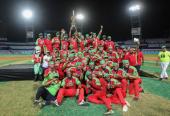Fidel Castro wins China's 'Confucius Peace Prize'

Fidel Castro has been awarded China's version of the Nobel Peace Prize, reports said Thursday, with a paper close to the ruling Communist Party hailing the former Cuban leader's "important contributions'' to world peace.
Castro bested more than 20 nominees including South Korean President Park Geun-Hye, UN Secretary General Ban Ki-moon, and the Shanghai Cooperation Organization, a regional group led by Moscow and Beijing, to win this year's ''Confucius Peace Prize'', the state-run Global Times reported.
The Cuban revolutionary icon was selected by nine judges out of a group of 16 experts and scholars, the paper said.
The shadowy Confucius prize emerged in 2010, when it was suddenly announced by the panel two days before jailed Chinese dissident Liu Xiaobo was awarded the Nobel to Beijing's anger, sparking speculation it was set up with the government's guidance.
A Cuban exchange student received this year's award on Castro's behalf at a ceremony on Tuesday, one day before Malala Yousafzai and Kailash Satyarthi accepted their Nobel Peace Prize in Oslo.
"While in office, Castro didn't resort to violence or force to settle disputes in international relations, especially with the United States,'' the Global Times wrote.
"After his retirement, he has been actively meeting with leaders and groups from all over the world and has made important contributions to emphasizing the need to eliminate nuclear war,'' it added.
Since leaving office in 2006 during a nearly fatal health crisis, Castro, 88, has spent his free time writing books and articles for the official press in Cuba, which now is led by his younger brother Raul.
In 2010, the first Confucius Peace Prize winner was awarded to Taiwan's Lien Chan at a chaotic press conference, although the former vice president's office denied all knowledge of it.
Organizers of the prize denied links to the government, but the award's executive chairman Liu Haofeng told AFP later that it had been set up by an association overseen by China's culture ministry.
In a move that added to the confusion surrounding the prize, the following year the ministry ordered organizers to scrap it, but the academics pressed ahead with their plans and gave it to Russian President Vladimir Putin.
Former UN Secretary General Kofi Annan and Chinese agricultural scientist Yuan Longping shared the award in 2012, and Yi Cheng, a Zen master who is the honorary head of the Buddhist Association of China, was awarded it last year.
China's foreign ministry on Thursday denied any government connection to the prize.
The award was "organized by a civil organization in China, which showcases their aspirations for world peace'', spokesman Hong Lei said at a regular briefing













Add new comment